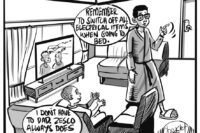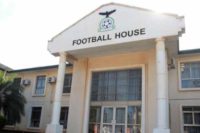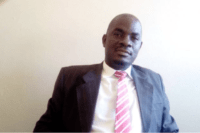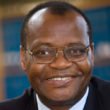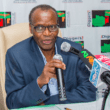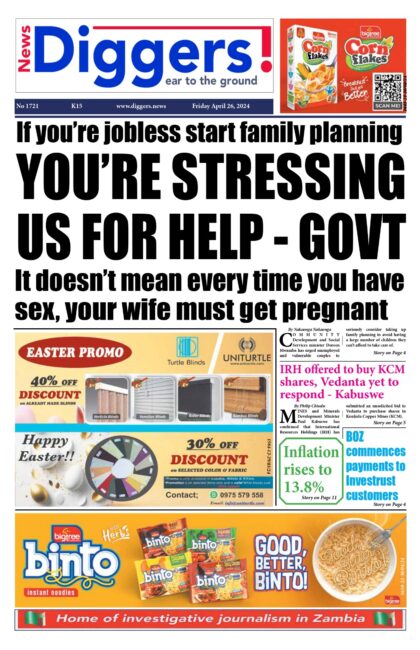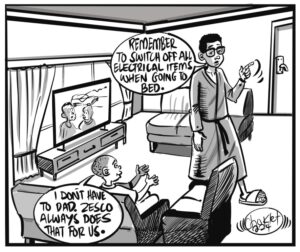American-based Zambian law professor, Muna Ndulo, has described the government-proposed Constitution amendment process as a theatre of the absurd, where the ruling party has hijacked the people’s agenda to manipulate the outcome.
And Professor Ndulo, who is Director for African Development at Cornell University, has supported the position held by the church mother bodies who have rejected the Constitution amendment process using a forum consisting all members of parliament and others appointed by the Secretary to the Cabinet.
The Zambian Government has announced its intention to enact into law a bill to implement the National Dialogue (Constitution, Electoral Process, Public Order and Political Parties.) The draft bill proposes to establish a forum to make amendments to the 2016 Constitution, the Elections Law and the Pubic Order Act.
But in his analysis, Prof Ndulo warned that the outcome of the process would represent the aspirations of the party in power and not the wishes of the people.
“I would also like to state that I completely support the analysis and views of the three church mother bodies and the eleven NGOs on the proposed bill. Their clear and correct understanding of constitutionalism makes me believe that despite the challenges we face today in giving our country a decent constitution, we need not despair. It is sad that those who want to push through this process and their surrogates have paraded a collection of characters who have no understanding of the role of a constitution in a democratic dispensation to publicly demonize the Church mother bodies and the NGOs. How does being a chief, a purely hereditary position, make one a constitutional expert? It is indeed a theatre of the absurd!” stated Prof Ndulo.
“The proposed 2019 constitution making process is deeply flawed and will fail to deliver a constitution that is legitimate and provides a framework for the democratic governance of Zambia. The process itself is inherently unrepresentative and is completely dominated and controlled by the party in power; the legislation creating the forum does not say a word about its philosophical approach to the constitution, but its phobia about values, transparency, institutionalization of accountability and policy is quite evident in its provisions.”
He observed that the process does not address Chapter 3 of the Constitution which contains the bill of rights.
“The draft Bill, describes the Forum it is setting up, as a forum for the implementation and enhancement of the Siavonga resolutions for proposals to: alter the constitution, based on the draft amendments proposed in the Constitution based on submissions from the stakeholders specified in the Schedule, following the enactment of the constitution of Zambia (Amendment) Act, 2016, and additional submissions from the church, and (b) reform the law on the electoral process, public order and regulation of political parties based on submissions from various stakeholders.” The Siavonga resolutions do not deal with the parts of the 1991 Constitution that requires a referendum to change. That means that this process does not address Chapter 3 of the Constitution which contains the bill of rights,” Prof Ndulo noted.
“It follows that social economic rights are not on the table. This more than anything reveals the real intentions of the government-not to produce a sound constitution but to rush through Parliament amendments designed to undermine their political competitors.”
He further expressed concern over the size of the proposed forum, stressing that the majority would be representing the aspirations of the Patriotic Front.
“The Forum is so large that it will be completely unyielding to good management and is reminiscent of the 2000 Zimbabwe Constitutional Forum which had up to 400 members and failed to produce a constitution. There can be no meaningful discussions in such a large forum, especially one completely controlled by the Government. Article 5 (1) provides: ‘The Forum consists of all Members of Parliament and the following members appointed by the Secretary to the Cabinet. It further provides that ‘The members of the Forum can on the recommendation of a standing committee be removed from the Forum and their membership terminated by the Secretary to the Cabinet.’” Prof Ndulo stated.
“In Zambia the Secretary to the Cabinet has limited space to act independently in a system heavy on patronage. The question remains why take this approach. Why would a democratic system not allow stakeholders to choose their representative without reference to government? Organizations should have been allowed to pick who ever they thought would represent them well and the Government should have no role in that.”
He further stated that the provision for voting for proposed amendments in the absence of consensus among forum members was dangerous, in that the PF would succeed to push its agenda as the voting majority would be representing its interests.
“In what is clearly a poorly drafted provision, article 4 (1) of draft Bill gives the Forum wide ranging functions, including the following: altering the constitution based on the draft amendments proposed to the Constitution… gives the Minister the right to submit the draft bills to Parliament for enactment. In another equally badly drafted provision article 4(3) requires the Forum to be accountable to the people of Zambia and in (4) (d) to ensure that the final outcome of the adoption process faithfully reflects the wishes of the people of Zambia. The legislation does not even attempt to provide any monitoring or control mechanism to ensure that these outcomes are achieved making the provisions empty rhetoric,” he stated.
“The draft Bill provides that ‘Questions before the forum or any of its committees shall be determined by consensus, but in the absence of consensus, decisions of the Forum shall be determined by simple majority vote of the members present, except that voting shall be by secret ballot.’ This is a very dangerous provision. There is absolutely no incentive to work towards consensus in this situation when you have a built in majority. It is in the interest of the majority party that there should be no consensus so that it can use its majority to adopt provisions of its choice.”
Prof Ndulo went on to state what would have been an ideal for a constitution-amendment process that represents the people’s will.
“The process of adopting a constitution is as important as its substance. The ambivalence on the role of experts in constitution making by the draft Bill is troubling. Experts play an important role in constitution making. It is not enough that there are lawyers among members of the Constitutional conference just as it would not be enough to have general medical practitioners where a patient requires heart surgery. Experts encourage and enhance the local process by ensuring the observance of international standards as reflected in international human rights instruments. Experts would also give the best practices of different parts of the world and especially from other African countries,” suggested Prof Ndulo.
“The draft Bill completely forgets that the clamor for a new constitution in Zambia is based on the public’s justified unhappiness of the misuse of Presidential power. Zambians want to put in place a constitution that ensures and guarantees good governance and creates a capable state that is able to deliver services to its people and guarantees human dignity. The ruling party is trying to hijack what was intended to be a peoples’ process by constituting itself into a body that serves as a vehicle for promoting party interests. Rather than consider the people as central to the process they have reduced the people into mere spectators.”




